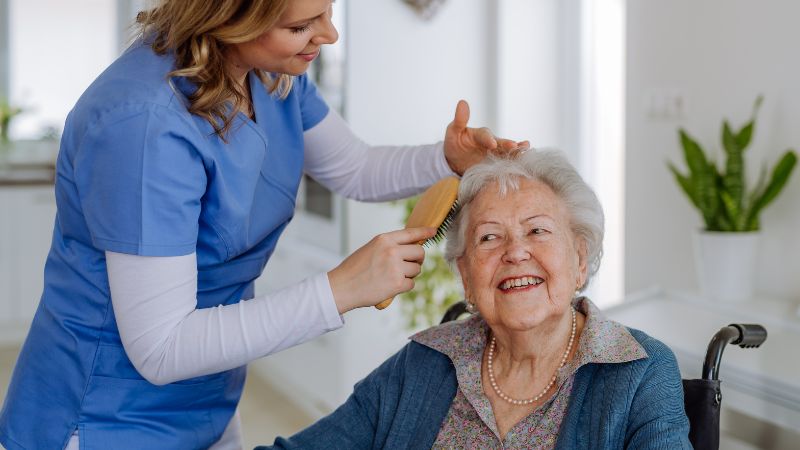
Pain is felt by dementia patients just as much as it is felt by anyone else. However, due to cognitive decline, seniors living with dementia may have difficulty expressing their pain. Pain management is important when caring for an elderly person with dementia. Dementia is a condition that affects a person’s abilities to problem solve, think, remember, and communicate. Individuals who suffer from severe dementia are no longer able to independently perform the activities of daily living. Alzheimer’s disease is a common cause of dementia. A senior who struggles with the cognitive decline associated with dementia is less likely to be able to communicate physical pain. Consequently, undertreatment of their pain is a likelihood. Furthermore, when pain is left untreated, the senior will experience a lower quality of life. When pain is acute, it may be due to an injury or infection. Acute pain lessens as the injured body part heals. Chronic pain may be caused by a long-term medical illness and is usually persistent. Arthritis, for example, is a common cause of chronic pain in the elderly.
What is the significance of pain?
Pain is telling. It is felt when the affected body part transmits signals to parts of the brain. These signals cause the sufferer to withdraw from the activity or object that is the source of the pain. Pain also helps protect the damaged body part as it continues to heal. Due to pain being a pivotal factor in protecting an individual from harm, it is crucial that attention be promptly given to an individual feeling pain. Families should be aware that the changes in the brain caused by dementia do not directly cause the senior pain. Seniors with dementia, however, are more likely to experience pain due to having a higher risk for falls, injuries, and accidents. Plus, dementia patients often live with other medical conditions that cause pain. Immobility in older people also causes joint stiffness and pressure sores. While a person with dementia will have difficulty communicating their pain, they also are more likely to forget the cause of the pain. These seniors may not remember how they became injured. Due to these reasons, caregivers should regularly assess pain levels in people with dementia. Pain management in dementia patients starts with identifying the pain. Ask simple questions, such as, “Are you in pain?” or “Does it hurt?” Severe dementia may prevent the senior from responding verbally. In these cases, caregivers should look for nonverbal signs of pain and distress.
What are signs of pain?
Facial expressions, such as a frown, rapid blinking, clenched teeth, and tightened eyes, can signal that the senior is in pain. Vocalizations also reveal pain. The dementia patient may grunt, groan, breathe noisily, call out for help, or even become verbally abusive. Changes in behavior also indicate pain. The senior may refuse food, rest longer or start to pace. Emotional signs of pain include becoming combative, resisting care, withdrawal, irritability and crying. Increased heart rate, slow movement and guarding a body part are physical indicators of pain.
What are nonpharmaceutical pain-relief options?
Once pain is identified, alleviation of the pain should promptly begin. Nonpharmaceutical approaches are cost-effective and have minimal side effects. Options to relieve pain include physical therapy, massage therapy, acupuncture, and chiropractic and occupational therapy. Cognitive behavioral therapy can be effective.
What pharmaceutical pain-relief options are available?
Drug therapies are beneficial in minimizing pain in elderly patients with dementia. Non-opioids rather than opioids are the preferred treatment. A pharmaceutical approach will be beneficial to reduce pain caused by post-surgical procedures, injuries, traumas, and mechanical low back pain. Mild, persistent pain may be reduced with acetaminophen. Starting the elderly on low doses of NSAIDs (non-steroidal, anti-inflammatory drugs) is recommended; however, NSAIDs must be used only briefly. Neuropathic pain may be eased with antidepressants but have increased side effects in seniors. Opioids, like morphine, are used to relieve moderate to severe pain in instances of advanced illness. However, due to age-related physiologic changes and suffering from other medical conditions (comorbidities), the elderly have a higher sensitivity to the effects of opioid analgesics.
What precautions should caregivers take?
Ongoing pain is more likely to be reduced rather than fully eliminated in the elderly. Any medications should be prescribed on a trial basis. A medication regimen should begin slowly and at a low dose. Attending physicians should be aware of the possibility of undertreatment. If the senior’s pain symptoms fail to improve with a certain medication, the individual may better respond to a different one. Seniors may be prone to interactions between supplements and drugs; so, caregivers are advised to be alert if the senior takes herbal or dietary supplements. When opioids are prescribed, strong consideration should be given to whether or not the senior or caregiver will responsibly manage opioid use. Be aware that opioids can cause mental clouding. Alternative therapies for pain relief should be considered to restore quality of life.  When your aging loved one lives with Alzheimer’s disease or any other form of dementia, consult Assisting Hands Home Care for compassionate elder care. Our dementia caregivers are alert to pain symptoms, are trained to respond to dementia symptoms, and help seniors feel comforted. Dementia patients who wander, experience forgetfulness, become agitated or suffer from incontinence receive skilled, nonmedical support from qualified Assisting Hands Home Care dementia caregivers. Our reputable memory care services also include timely medication reminders, transportation to doctors’ offices, and personal care. Remaining in a home setting is ideal for seniors with dementia, as the familiar environment reduces disorientation. Due to the many benefits of aging in place, in-home dementia care from Assisting Hands Home Care is the choice many families and their aging loved ones prefer. When you and the senior in your life are ready to explore dementia care, contact Assisting Hands Home Care at (262) 753-6652 for a complimentary in-home assessment. Our in-home memory care services are designed to ensure that seniors in Brookfield, Pewaukee, Elm Grove, Wisconsin, continue to have a high quality of life. Sources: https://archive.alzheimer.ca/sites/default/files/files/national/for-hcp/hcp_pain_e.pdf,%20https://www.alz.org/alzheimers-dementia/what-is-dementia,%20https://www.dementia.org.au/sites/default/files/helpsheets/Helpsheet-DementiaQandA16-PainAndDementia_english.pdf,%20https://archive.alzheimer.ca/sites/default/files/files/national/for-hcp/hcp_pain_e.pdf,%20lisbon wi
When your aging loved one lives with Alzheimer’s disease or any other form of dementia, consult Assisting Hands Home Care for compassionate elder care. Our dementia caregivers are alert to pain symptoms, are trained to respond to dementia symptoms, and help seniors feel comforted. Dementia patients who wander, experience forgetfulness, become agitated or suffer from incontinence receive skilled, nonmedical support from qualified Assisting Hands Home Care dementia caregivers. Our reputable memory care services also include timely medication reminders, transportation to doctors’ offices, and personal care. Remaining in a home setting is ideal for seniors with dementia, as the familiar environment reduces disorientation. Due to the many benefits of aging in place, in-home dementia care from Assisting Hands Home Care is the choice many families and their aging loved ones prefer. When you and the senior in your life are ready to explore dementia care, contact Assisting Hands Home Care at (262) 753-6652 for a complimentary in-home assessment. Our in-home memory care services are designed to ensure that seniors in Brookfield, Pewaukee, Elm Grove, Wisconsin, continue to have a high quality of life. Sources: https://archive.alzheimer.ca/sites/default/files/files/national/for-hcp/hcp_pain_e.pdf,%20https://www.alz.org/alzheimers-dementia/what-is-dementia,%20https://www.dementia.org.au/sites/default/files/helpsheets/Helpsheet-DementiaQandA16-PainAndDementia_english.pdf,%20https://archive.alzheimer.ca/sites/default/files/files/national/for-hcp/hcp_pain_e.pdf,%20lisbon wi
















